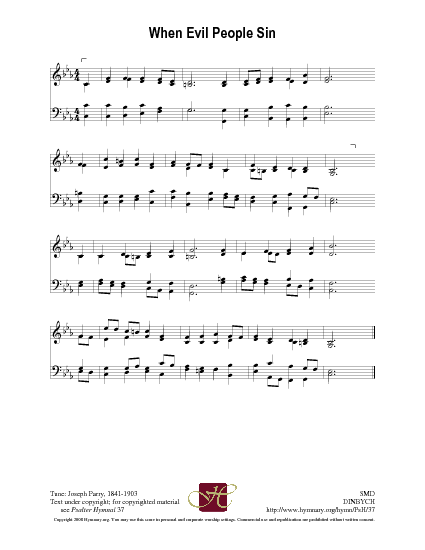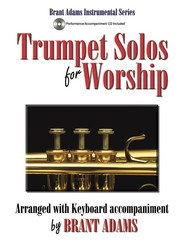- |
User Links
When Evil People Sin

When evil people sin
Versifier: Bertus Frederick Polman (1985)Published in 2 hymnals
Printable scores: PDF, MusicXMLAudio files: MIDI
Versifier: Bertus Frederick Polman
 Bert Frederick Polman (b. Rozenburg, Zuid Holland, the Netherlands, 1945; d. Grand Rapids, Michigan, July 1, 2013) was chair of the Music Department at Calvin College and senior research fellow for the Calvin Institute of Christian Worship. Dr. Polman studied at Dordt College (BA 1968), the University of Minnesota (MA 1969, PhD in musicology 1981), and the Institute for Christian Studies. Dr. Polman was a longtime is professor of music at Redeemer College in Ancaster, Ontario, and organist at Bethel Christian Reformed Church, Waterdown, Ontario. His teaching covered a wide range of courses in music theory, music history, music literature, and worship, and Canadian Native studies. His research specialty was Christian hymnody. He was also an… Go to person page >
Bert Frederick Polman (b. Rozenburg, Zuid Holland, the Netherlands, 1945; d. Grand Rapids, Michigan, July 1, 2013) was chair of the Music Department at Calvin College and senior research fellow for the Calvin Institute of Christian Worship. Dr. Polman studied at Dordt College (BA 1968), the University of Minnesota (MA 1969, PhD in musicology 1981), and the Institute for Christian Studies. Dr. Polman was a longtime is professor of music at Redeemer College in Ancaster, Ontario, and organist at Bethel Christian Reformed Church, Waterdown, Ontario. His teaching covered a wide range of courses in music theory, music history, music literature, and worship, and Canadian Native studies. His research specialty was Christian hymnody. He was also an… Go to person page >Text Information
| First Line: | When evil people sin |
| Title: | When Evil People Sin |
| Versifier: | Bertus Frederick Polman (1985) |
| Meter: | 6.6.8.6 D |
| Source: | Christopher Idle, based on a text by |
| Language: | English |
| Copyright: | Text © 1987, CRC Publications |
Notes
A contrast of the way of the righteous and the way of the ungodly; the wages of the one and the hope of the other.
Scripture References:
st. 1 = vv. 1-6
st. 2 =vv. 7-11
st. 3 = vv. 12-20
st.4=vv.21-26
st. 5 = vv. 27-33
st. 6 = vv. 34-40
In Old Testament wisdom style, Psalm 37 contrasts the way of the wicked and the way of the righteous (see also 1, 34, 49, 73, and 112). Even though the wicked, by their scheming and violence, appear to prosper, it is the righteous, those trusting in the LORD, who will possess the (promised) land. In a series of images, the psalm portrays the wicked in their apparent power and wealth and repeatedly overrides their folly with an image of the lasting salvation of the faithful. Do not envy the wicked; trust in God, says the psalmist (st. 1). Do not fret when wickedness succeeds; wait patiently for the LORD (st. 2). God frustrates the wicked but blesses the righteous (st. 3). The wicked are miserly, but the righteous are generous; God will surely help the righteous (st. 4). The righteous live godly lives, and the LORD will always protect them (st. 5). God's blessing and salvation are reserved for those who trust and obey (st. 6). Reworking an earlier text of Christopher M. Idle (originally prepared for Psalm Praise, 1973), Bert Polman versified this psalm in 1985 for the Psalter Hymnal.
Bert Frederick Polman (b. Rozenburg, Zuid Holland, the Netherlands, 1945) immigrated to Canada in 1955. Trained in hymnology, he was a member of the revision committee that produced the 1987 Psalter Hymnal and is primary author of this companion volume. He was also a member of the editorial committees for The Worshiping Church (1990), Songs for LiFE (1994), and Amazing Grace, Hymn Texts for Devotional Use (1994). Educated at Dordt College, Sioux Center, Iowa, and the University of Minnesota (Ph.D. 1981; dissertation "Church Music and Liturgy in the Christian Reformed Church of North America"), he did postgraduate work at the Institute for Christian Studies in Toronto. Polman has served as organist and choirmaster at Oakland United Methodist Church, Minneapolis (1968-1972), and St. John's Anglican Church, Mississauga, Ontario (1972-1974). He was liturgist of the Campus Worship Community at the University of Toronto and organist at Fellowship Christian Reformed Church, Rexdale, Toronto (1977-1985) while teaching music at Ontario Bible College in Toronto (1975-1985). From 1985 to 1991 Polman was organist at Immanuel Christian Reformed Church in Hamilton, Ontario, and currently holds a similar position at Bethel Christian Reformed Church in nearby Waterdown. Since 1985 he has also taught music at Redeemer College in Ancaster, Ontario. He has served on the editorial council of Reformed Worship, the executive committee of the Hymn Society in the United States and Canada, and the denominational worship committee of the Christian Reformed Church. Despite partial vocal paralysis, Polman is a frequent conference speaker.
Liturgical Use:
Occasions of wisdom teaching contrasting the righteous with the wicked.
--Psalter Hymnal Handbook
Tune
DINBYCHJoseph Parry (PHH 18) composed DINBYCH and named it after the city of Dinbych in northern Wales. The tune first appeared in Llyfr Tonau Cynulleidfaol Cenedlaethol Cymru (The Welsh National Book of Congregational Tunes) which was edited by Parry and published in several parts from 1887 to 1892. DINBY…
TERRA BEATA
TERRA BEATA was originally a traditional English folk tune, a variant of which, entitled RUSPER, appeared in The English Hymnal in 1906. Franklin L. Sheppard (b. Philadelphia, PA, 1852; d. Germantown, PA, 1930) arranged the tune for Babcock's text and published it in the Presbyterian church school h…


 My Starred Hymns
My Starred Hymns




